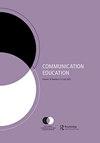(暂时)告别K-12沟通教育
IF 0.8
Q3 COMMUNICATION
引用次数: 0
摘要
1989年,Cassandra Book呼吁学者们研究如何在K-12课堂上教授沟通。近30年来,学者们一直对K-12沟通奖学金的下降表示担忧(Hunt et al.,2014),认为沟通在K-12教师认证中的重要性(Rudick&Dannels,2020;Wright,2020),最近,倡导国家传播协会(NCA)参与制定K-12传播教育学研究议程(Yastremski&Morreale,2021)。在他们的文章中,Yastremski和Morreale(2021)提出了四种推进这一领域学术和宣传的策略。本文将阐述他们的第一个策略,即要求学者制定沟通教育学K-12研究议程。可悲的是,多年来,在不同的倡导呼声中,K-12沟通教育学研究几乎没有变化。也许是对我们作为一门学科在认识到K-12沟通教育学研究的重要性方面的失败感到懊悔,这促使我们定期回顾Book 1989年的论点。从智力上讲,我们意识到在K-12课堂上交流的重要性;然而,当我们被要求提供奖学金或支持时,我们却未能获得奖学金或支持。或者,也许是怀旧,因为我们中的许多人都是从K-12教师或演讲和辩论教练开始职业生涯的,这让我们陷入了一种挥之不去的奖学金缺失的对话中。我们的学科对K-12沟通教育学奖学金缺乏兴趣,这让人感到不安。尽管这可能令人不安,但现实是严峻的。在Book发出呼吁后的32年里,我们未能发展这一研究领域。然后,也许是由于缺乏行动,该学科发表了意见——这不是一条值得提供资源支持的研究路线。传播学科的成功归功于与K-12教育工作者有关的历史。NCA诞生于K-12沟通教师与英语教师的分离。尽管学者们经常承认这段历史,并对我们的K-12教育工作者表示钦佩,但他们对这些根源所做的只有表演性的亲切姿态。例如,NCA不再有关于K-12通信的特定标准。虽然NCA确实有一份立场声明,支持将沟通作为高中毕业要求,并决心为这一事业提供支持,但粗略浏览一下资源,就会发现NCA制作了一份资源和链接,链接到以下内容:大学董事会、TeAchnology、PBS LearningMedia和the Learning Network(National communication Association,n.d.)本文章由计算机程序翻译,如有差异,请以英文原文为准。
A goodbye (for now) to K-12 communication education
In 1989, Cassandra Book called on scholars to examine how communication was taught in K-12 classrooms. For nearly 30 years, scholars have expressed concern regarding the decline of K-12 communication scholarship (Hunt et al., 2014), argued for the importance of communication in K-12 teacher certification (Rudick & Dannels, 2020; Wright, 2020), and most recently, advocated for the National Communication Association’s (NCA) involvement in developing a K-12 communication pedagogy research agenda (Yastremski & Morreale, 2021). In their article, Yastremski and Morreale’s (2021) proposed four strategies for advancing scholarship and advocacy in this realm. This essay will address their first strategy, which asks scholars to develop a communication pedagogy K-12 research agenda. Sadly, through the years and across the different calls for advocacy, very little has changed regarding K-12 communication pedagogy research. Perhaps it is remorse for our failures as a discipline in recognizing the importance of K-12 communication pedagogy research which draws us to periodically revisit Book’s 1989 argument. Intellectually, we are aware of the importance of communication in K-12 classrooms; however, we have failed to produce scholarship or support when called upon to do so. Or maybe, it is nostalgia, as many of us began our careers as K-12 teachers or speech and debate coaches, that keeps us in a conversation with a haunting absence of scholarship. There is something unsettling about our discipline’s lack of interest in K-12 communication pedagogy scholarship. Unsettling as it may be, the reality is grim. In the 32 years since Book’s call, we have failed to develop this line of research. Then, perhaps by lack of action, the discipline has spoken—this is not a line of research worthy of forwarding resources to support. The communication discipline owes its success to a history linked with K-12 educators. NCA was born out of K-12 communication teachers separating themselves from English teachers. Although scholars frequently acknowledge the history and express admiration to our K-12 educators, they seldom do more than performative cordial gestures to these roots. For example, NCA no longer has specific standards on K-12 communication. While NCA does have a position statement that supports communication as a high school graduation requirement and resolves to provide support toward this cause, a cursory glance at the resources shows one NCA produced resource and web links to the following: College Board, TeAchnology, PBS LearningMedia, and The Learning Network (National Communication Association, n.d.). The glaring absence of
求助全文
通过发布文献求助,成功后即可免费获取论文全文。
去求助
来源期刊

COMMUNICATION EDUCATION
EDUCATION & EDUCATIONAL RESEARCH-
CiteScore
3.10
自引率
34.80%
发文量
47
期刊介绍:
Communication Education is a peer-reviewed publication of the National Communication Association. Communication Education publishes original scholarship that advances understanding of the role of communication in the teaching and learning process in diverse spaces, structures, and interactions, within and outside of academia. Communication Education welcomes scholarship from diverse perspectives and methodologies, including quantitative, qualitative, and critical/textual approaches. All submissions must be methodologically rigorous and theoretically grounded and geared toward advancing knowledge production in communication, teaching, and learning. Scholarship in Communication Education addresses the intersections of communication, teaching, and learning related to topics and contexts that include but are not limited to: • student/teacher relationships • student/teacher characteristics • student/teacher identity construction • student learning outcomes • student engagement • diversity, inclusion, and difference • social justice • instructional technology/social media • the basic communication course • service learning • communication across the curriculum • communication instruction in business and the professions • communication instruction in civic arenas In addition to articles, the journal will publish occasional scholarly exchanges on topics related to communication, teaching, and learning, such as: • Analytic review articles: agenda-setting pieces including examinations of key questions about the field • Forum essays: themed pieces for dialogue or debate on current communication, teaching, and learning issues
 求助内容:
求助内容: 应助结果提醒方式:
应助结果提醒方式:


